Mediamax talked to Matthias Kiesler, Ambassador of Germany to Armenia, on the occasion of the Day of German Unity celebrated on October 3. 26 years ago, on October 3, 1990, the goal of a united Germany that originated in the middle of the 19th century, was fulfilled again.
- Armenia recently marked the 25th anniversary of its independence and will next year mark the 25th anniversary of establishing diplomatic relations with Germany. What would you name the biggest achievement over these 25 years?
- Indeed, we were one of the first countries to recognize Armenia. Very soon we established diplomatic relations and opened the Embassy, and since then we’ve seen remarkable progress in our relations. And today we can say that hardly any other European country has such a deep and comprehensive relationship with Armenia in all fields - political, economical, development, culture and military-political. We have very broad cooperation, and we tend to make it even broader and deeper in the next years.
- Press releases about bilateral meetings read that “the sides agreed that there is big potential to develop relations more”. What do you think can be done in near future?
- We have several priorities for next year.
In the cultural field, we would like to strengthen German language in Armenia. We feel there is a strong interest especially by young people to learn German. We already have a language center, five schools supported by the German Government, but we want to make it more intensive, so that at one school, from beginning to the end, the pupils will learn German at such a level that they will have the skill to study in Germany.
Another project we are working on is that we would like to have a Goethe cultural institute here. The German Embassy already organized a big number of events with partners here, but we feel it is time that we have an independent Goethe Institute such as we have it in Tbilisi.
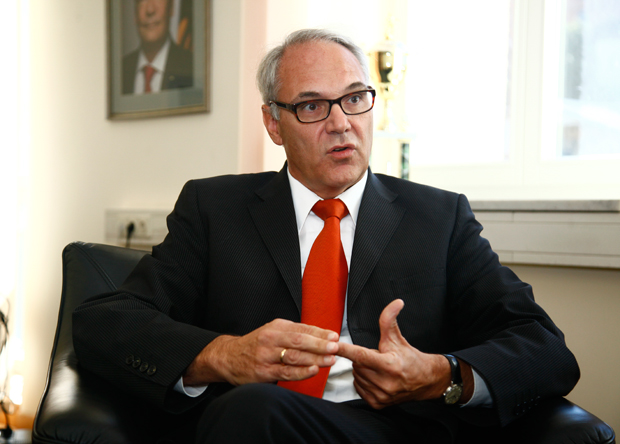 Matthias Kiesler
Matthias KieslerPhoto: Mediamax
In the economic field we indeed see more and more potential. There is a rising interest of German entrepreneurs to come here not just for trade. Germany is already the biggest trading partner for Armenia within the European Union, and that’s good, but we think there is also more potential for German companies to produce here for several reasons. One of them is that from here you can enter the Russian market much easier because Armenia is a member of the Eurasian Economic Union. Armenia and Iran have very good relations, so there is a reason to produce here and maybe to export to Iran.
Armenia in principle is a small, isolated country, and this is a disadvantage. But now that you have good relations with Iran and you are a part of the Eurasian Economic Union, this could be an advantage. We try to develop it, and only last week I met a CEO of a German company, and he’s seriously thinking to invest here and produce here. We will follow up with that.
- You also mentioned the military cooperation. For many years Armenian peacekeepers have been serving in Afghanistan under the German command. I think the importance of this cooperation is not only the peacekeeping itself, but also the possibility of the Armenian and German military to cooperate and become interoperable.
- You are right, German Armed Forces have very good cooperation with our Armenian partners in Afghanistan. It could be a model for future possible cooperation in peace keeping mission. We also train members of Armenian Armed Forces in Germany and we have a constant exchange of visiting delegations. it is a comprehensive program.
- During past years Armenian President visited Germany for several times, and I am wondering if there’s a chance that German Chancellor will visit Armenia some day?
- Well, it is possible that Chancellor Merkel will visit the South Caucasus, but for the time being there are no concrete plans. We will have elections next year, and I’m afraid the schedule is very tight. But we had our Minister here, also in his function as the Chairman-in-Office of the OSCE, and we will continue of course with high-ranking visits.
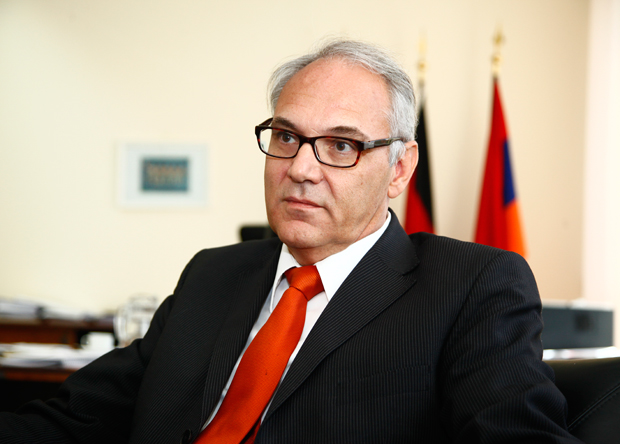 Matthias Kiesler
Matthias KieslerPhoto: Mediamax
One of the highlights of this year was the visit of President Sargsyan to Berlin. One of the major topics, beside the political issues, was the desire to boost economic relations.
- There are some rumors in Armenia that Angela Merkel visited Armenia as a tourist when she was still living in the German Democratic Republic. Do you have any information on that?
- I don’t have any exact information on that. She is a scientist, she studied physics, so it could have been that as a student she had been here. Chancellor Merkel is a very curious person and very open to other cultures, so I could imagine that she was here.
- The adoption of Armenian Genocide Resolution was a moral issue or a political issue first for the ruling German elite and Bundestag?
- I think both. One of the parts of the Resolution clearly stated that there was also some responsibility on the German side for what happened a hundred years ago, we feel partly responsible for that. It is in a sense moral, but also political, of course. The Bundestag came to the conclusion that, ten years after the resolution in 2005, it has to be revised and adapted, among others, to the internal discussion in Germany.
- Let’s discuss the Armenia-EU relations. Talks on the new Framework Agreement are underway. What do you think about the process? How well is it going?
- Yes, the negotiations are going on, the next phase will be in October. It is good that we are on track again. Two years ago it looked a little bit different, but it’s good that the Armenian Government took the chance and our offer to negotiate this Framework Agreement.
It is a tool to support Armenia in its process of modernization. The EU and its member states are ready to support Armenia in many fields, be it in the economic area, development cooperation, trade and political dialogue. A framework agreement will further promote our engagement in Armenia.
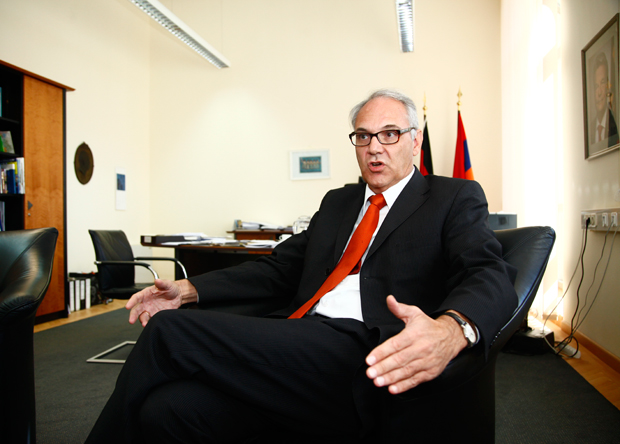 Matthias Kiesler
Matthias KieslerPhoto: Mediamax
There are different chapters. It won’t be as comprehensive as the original one, especially we have to see on trade, because it has to be compatible with other agreements, but it is both a political and an economic tool. We could benefit from a whole range of provisions foreseen in this agreement. We are in the process of the negotiations, and I am very optimistic that we will come to conclusion next year.
- Sometimes you can see speculations that after the situation with the Association Agreement the European partners have some kind of distrust toward the Armenian side.
- No, just the opposite.
- Armenian Foreign Minister made several statements this year that the time has come to start the visa liberalization process with the EU. What is your opinion on that?
- I fully understand that the population is eager to have visa liberalization so that it is easier to visit the Schengen Area. But to take it into the full context, I just got the figures from our visa section, and the number of multiple visas issued for 1 year, 2 or even for 5 years has drastically increased last year. Many visa applicants don’t have to apply, let’s say every six months. The other thing is that we have to take into consideration that more than 90% of those who apply will get a visa, so the rejection rate is relatively low in Armenia.
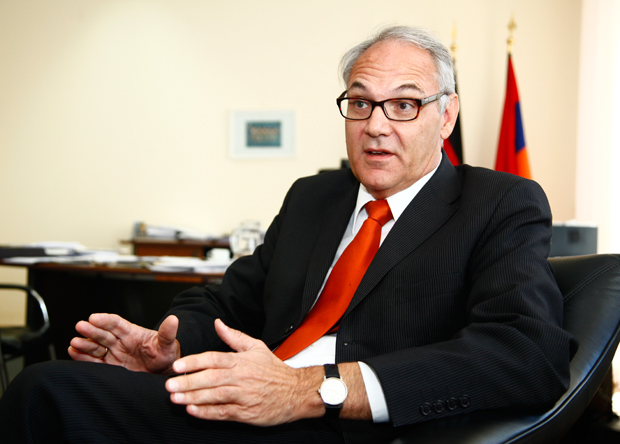 Matthias Kiesler
Matthias KieslerPhoto: Mediamax
Coming back to the question if we can expect visa liberalization, I think one should work on it, but one should be also realistic. This is a very hotly debated topic in the European Union not so much with Armenia but with those countries who are further ahead, who are already in the process. Even for them it seems so there is some reluctance in some member states to give the visa liberalization very quickly. I think the time will come for starting the visa liberalization process, but Armenia should be patient.
- Germany has supported many reforms in different sectors in Armenia. Many people in the society believe that we could’ve built a better Armenia in these 25 years. Which do you think are the biggest obstacles for the reform process? Is it within the ruling system or people just don’t understand that if you want to change something in your country you have start from yourself?
- I think modernization is the keyword for the development of Armenia. Modernization can be supported by outside actors like the European Union, Germany and other partners, but the main responsibility is the society and those who rule the country. These are the main actors and they have to work on it and improve the conditions. We can support it by different means, but mainly it is up to the society.
One issue is modernization of economy. You have now a new Government, and we see clear signals coming from the new Prime Minister and the Ministers, most of whom come from the business, to work for a change and deliver concrete results. I think this is what the population really expects - more jobs, better jobs, better education. There’s a long list that Government can work on, and we have to see in the next couple of months if the Government can fulfill the expectations a lot of people have in the country. But one should give them the credit to start now and to improve the economic situation.
- The fight against corruption is one of the key directions of the Armenia-EU cooperation. Experts say that the legislation and the frameworks are good, so the only issue is the absence of political will. What do you think about that?
- You have good laws here, and you talk about issues like corruption, and it’s good that it’s not a taboo to talk about it. But we would like to see more things done with corruption in different fields. We would like to see that the judiciary is more independent. Also for foreign investors it takes sometimes too long to get your right in the court. These are some of the issues we discuss with the Government. Ambassadors of the EU member-states started with the former Armenian Prime Minister a substantial dialogue to tackle these problems. I expect and I hope that we will continue this dialogue with the new Prime Minister.
- Many believe that settlement of the Nagorno-Karabakh issue is the key to solution of many problems in Armenia and Azerbaijan, and the whole region. But the reality is that there is no real negotiation process taking place for quite long. The Presidents meet once or twice a year, but there is no negotiation process. What do you think should become the incentive that will allow Presidents of Armenia and Azerbaijan to engage in a true dialogue?
- The Nagorno-Karabakh conflict also is linked with the internal situation, a lot of resources are taken for the Army, but it shouldn’t be taken as a pretext. A lot of problems can be solved without the settlement of Nagorno-Karabakh issue, corruption and so on.
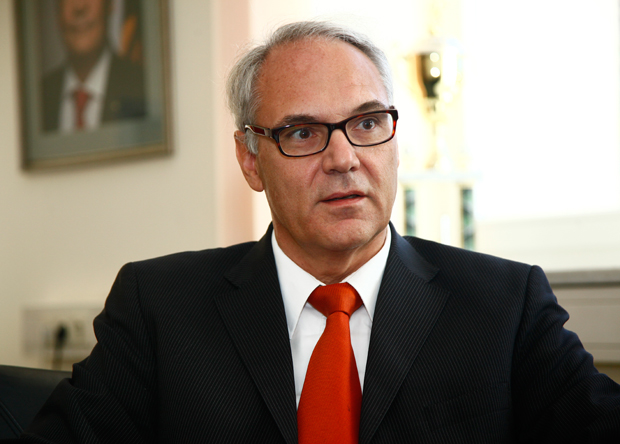 Matthias Kiesler
Matthias KieslerPhoto: Mediamax
Talking about the conflict, first of all, the most important thing is for the ceasefire to hold. It seems that the tension have increased in last weeks. We also fully support the establishment of investigative mechanisms and the increase of the presence of the OSCE monitoring at the Line of Contact. This is one step – reduce the tension and implement that what was agreed upon in St. Petersburg and Vienna. But it is also necessary to take up again substantial political negotiations and finally, to find a solution acceptable to all sides.
I think it is important to prepare the population in both countries that compromise is necessary. Politicians on both sides have to “sell” any final solution to the population. Unfortunately, it looks like that the readiness and willingness for compromise among the population is decreasing. Compromise is not easy, but it’s an essential step.
- The Nagorno-Karabakh issue is not directly linked with Armenian-Turkish relations, but from psychological viewpoint, for many people in Armenia it’s much more difficult to go for a compromise in the NK issue in the current state of Armenian-Turkish relations, because they feel like we’re in a fortress under siege, surrounded by enemies. Many say that if there was a progress in Armenian-Turkish relations, it would be easier to go for compromise. Do you think that the EU could play a role in convincing Turkey to return to the 2009 Protocols?
- One should use any tool available to improve relations between Armenia and Turkey. It would be very helpful of course, if the spirit of the Zurich Protocols could be revived. It’s difficult to estimate if there is will on both sides to return to these political negotiations. What we could do now, and Germany and other partners, in particularly the EU, are working on it, is to bring the civil society from both countries together – journalists, people from the cultural area, professors. We should think about pragmatic solutions, for example, economy. Very often business people are very quick and pragmatic when it comes to normalization. They want to have trade and make profits, so why not bring together the chambers of commerce on both sides of the border? Or why not opening the border for trade between the regions in East Turkey and Armenia? Or for international tourists so that they can travel more easily to visit the cultural sites on the other side of the border, such as Ani? Pragmatic solutions should be possible with good will on both sides. Just small steps that make life easier and will lead it into the right direction.
Ara Tadevosyan talked to Matthias Kiesler
















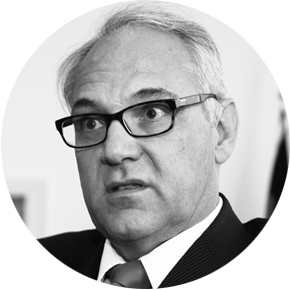










Comments
Dear visitors, You can place your opinion on the material using your Facebook account. Please, be polite and follow our simple rules: you are not allowed to make off - topic comments, place advertisements, use abusive and filthy language. The editorial staff reserves the right to moderate and delete comments in case of breach of the rules.